Buda Hills
The Buda Hills (Hungarian: Budai-hegység) are a low mountain range of numerous hills which dot the Buda side of Budapest, capital of Hungary. The most famous ones located within city limits are Gellért Hill, Castle Hill, Rózsadomb, Sváb Hill, János Hill, Széchenyi Hill and Eagle Hill. These hills consist of both nature and residential areas.
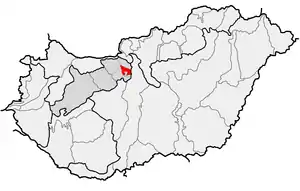
Geology
The Budaörs dolomite of Anisian-Carnian age (Triassic period) is the oldest formation which crops out in the Buda Hills.[1] Younger Triassic succession is composed of cherty dolomite and limestone (basin facies), and dolomite combined with limestone (platform facies).[2][3] The Trassic surface is composed of karstified carbonates,[4] which are overlain by an Upper Eocene succession made of conglomerate beds.[5]
During the period from the terminal Cretaceous to Priabonian, the area was a karstic terrestrial environment displaying distinct relief differences. It was also the time when Triassic formations were eroded. The continental period (ended by the transgression in Late Eocene) was characterized by the formation of small fans at the slope foots. The fans contained substantial quantities of andesite clasts thanks to the fans' close location to the andesite source rocks. The clasts could have been then transported by periodic streams along the valleys. The Late Eocene transgression reworked accumulated terrestrial sediments.[6]
Important hills
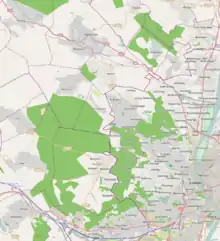
The most important hills of the region are:
- Budaörsi Hill
- Ferenc Hill
- János Hill
- Kutya Hill
- Nagy-Kopasz
- Nagy-Szénás
- Remete Hill
- Szabadság Hill
- Széchenyi Hill
- Zsíros Hill
Gallery
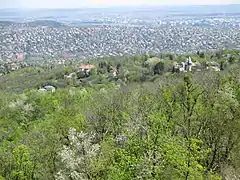 A view of the hills
A view of the hills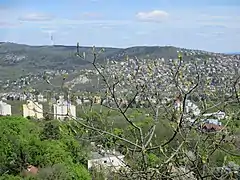 Another view
Another view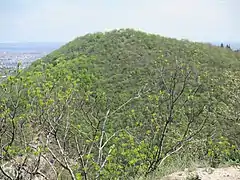 Hunyad-orom
Hunyad-orom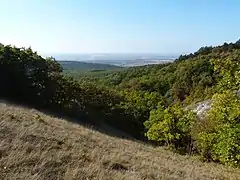 A slope from the hills
A slope from the hills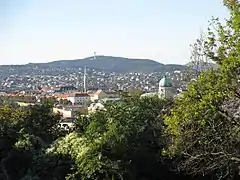 A view from Gellért Hill
A view from Gellért Hill
Further reading
- Budai-hegység [Buda Hills Atlas]. Cartographia. Budapest. 2007. ISBN 9789633525739.
- Bedő István (1999). Nyugat Pest megye útikönyv (Budai-hegység). Nagykovácsi. ISBN 963-550-956-1.
- Hegytörténet. Hegytörténeti Konferencia Budapest-Hegyvidék 2000. Szerk.: Noéh Ferenc. XII. kerületi Önkormányzat és Tarsoly Kiadó. Budapest. 2001.
- Juhász Árpád (1988). dr. Gál Éva: A budai hegyvidék. Képzőművészeti Kiadó. ISBN 963-336-436-1.
- Magyarország kistájainak katasztere. Szerk.: Dövényi Zoltán. MTA Földrajztudományi Kutatóintézet. Budapest. 2010. ISBN 978-963-9545-29-8.
- Dr. Pápa Miklós (1956). Budai hegyek útikalauz, Sport Lap- és Könyvkiadó. Budapest.
- Dr. Pápa Miklós (1966). Budai-hegység útikalauz, Sport. Budapest.
References
- Haas, János; Budai, Tamás; Dunkl, István; Farics, Éva; Józsa, Sándor; Kövér, Szilvia; Götz, Annette; Piros, Olga; Szeitz, Péter (2017-09-13). "The Budaörs-1 well revisited: Contributions to the Triassic stratigraphy, sedimentology, and magmatism of the southwestern part of the Buda Hills". Central European Geology. Acta Geologica Hungarica. 60 (2): 201–229. Bibcode:2017CEJGl..60..201H. doi:10.1556/24.60.2017.008. ISSN 1788-2281.
- Balogh, K. (1981). "Correlation of the Hungarian Triassic". Acta Geologica Hungarica. 24 (1): 3–48.
- Kozur, Heinz; Mock, Rudolf (October 1991). "New Middle Carnian and Rhaetian conodonts from Hungary and the Alps. Stratigraphic importance and tectonic implications for the Buda Mountains and adjacent areas" (PDF). Jahrbuch Geologischen Bundesanstalt. 134: 271–297.
- Kósa, Gábor; Mindszenty, Andrea; Mohai, Rita (2003). "Eocene alluvial fan prograding over a highly dissected palaeokarst surface built up by Upper Triassic dolomites. New details on the early Palaeogene evolution of the Buda-Hills" (PDF). Bulletin of the Hungarian Geological Society. 133 (2): 271–285.
- Magyari, Árpád (1994). "Late Eocene Transpression in the Budaörs Hills". Bulletin of the Hungarian Geological Society. 124 (2): 155–173.
- Farics, Éva; Farics, Dávid; Kovács, József; Haas, János (2017-10-28). "Interpretation of sedimentological processes of coarse-grained deposits applying a novel combined cluster and discriminant analysis". Open Geosciences. 9 (1): 525–538. Bibcode:2017OGeo....9...40F. doi:10.1515/geo-2017-0040. ISSN 2391-5447.
External links
| Wikimedia Commons has media related to Buda Hills. |